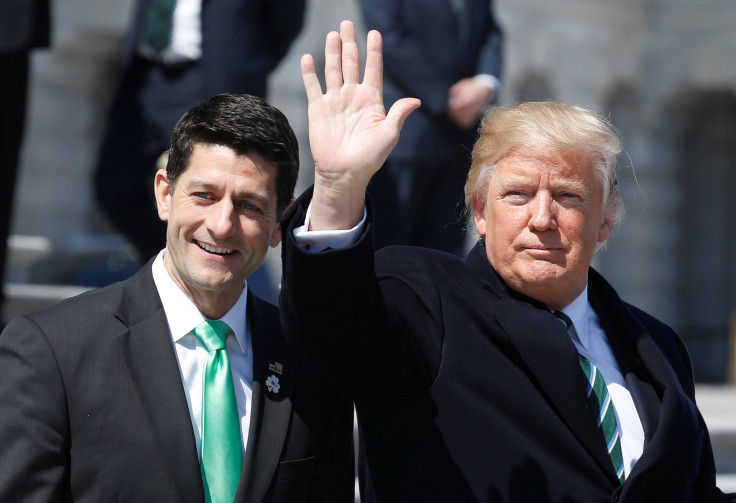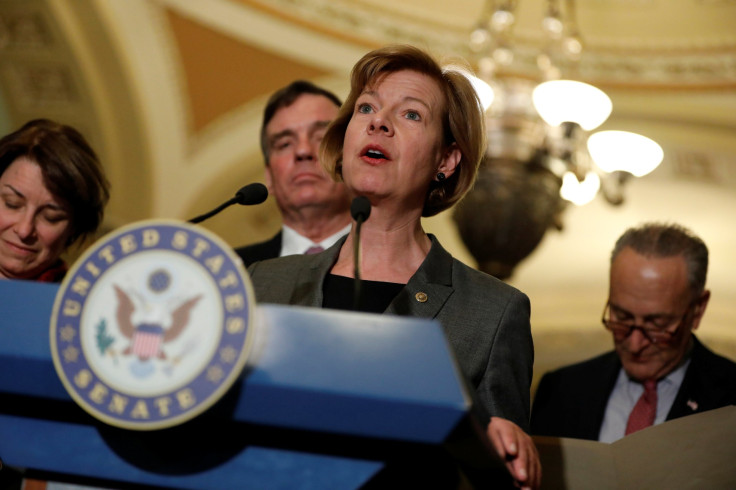Democrats' New Bill Presses Donald Trump To Honor His ‘Buy America’ Campaign Promises

Courting the Midwest voters who proved pivotal in his election win, Donald Trump has consistently reiterated his campaign promise to rebuild America’s infrastructure and protect domestic jobs. "We will have two simple rules when it comes to this massive rebuilding effort,” he told an audience at a post-election rally in December. “Buy American and hire American.”
Within days, though, House Republicans -- under pressure from lobbyists for foreign companies -- had killed legislation that would have directed government infrastructure contracts to American manufacturing companies. It was a bold act of defiance against the rhetoric of the newly elected president, and now a top Democrat is attempting to force Trump to put his “Buy America” promises into action -- against his own party in Congress.
On Friday, Wisconsin Sen. Tammy Baldwin will reintroduce legislation requiring billions of dollars of the government’s spending on water infrastructure to go only to projects that use American steel. Baldwin’s move is particularly notable because she hails from a state that proved critical to Trump’s win. It is also the home state of House Speaker Paul Ryan, the Republican whose office helped kill the initiative in December.
“Now is the time for President Trump to decide if he will keep his promises by supporting this legislation, or will he go along to get along with Congressional Republicans who have embraced the status quo and blocked this legislation that puts in place a strong Buy America standard,” said Baldwin, who planned to announce the bill at a Wisconsin foundry that makes manhole covers for cities throughout the United States. “The choice for the Republican establishment in Washington is clear: Do you stand with American manufacturers and workers or do you support spending taxpayer dollars on Chinese and Russian steel for American water infrastructure projects?”
Baldwin’s bill deals with the Drinking Water State Revolving Fund, which in the last two decades has delivered nearly $28 billion in financing for more than 12,000 drinking-water projects across the country. Her legislation would mandate that moving forward, the program targets its funding to projects that use only American-made iron and steel.
The domestic steel industry has shed tens of thousands of jobs in the past decades as both Democratic and Republican presidents pushed more free trade deals, which critics say have opened the country to unfair competition from state-subsidized foreign companies.
Those trade pacts have not only opened the U.S. market to competition, they have also typically included provisions threatening signatories with sanctions if they give preference to domestic contractors in government spending decisions. The provisions are designed to create a level playing field for domestic and foreign contractors in competition for government contracts, but the playing field may not be as level as the deals promised.
The Government Accountability Office issued a report earlier this month showing that compared to 57 of its trading partners covered by procurement agreements, the United States is opening up far more of its government spending to foreign contractors. In all, the report found that the United States opened up $837 billion of its government spending to foreign contractors, while its next five largest trading partners opened up less than half that amount to U.S. contractors. Percentage-wise, the U.S. federal government opened up 80 percent of its procurement to foreign contractors -- far higher than major trading partners such as Japan (30 percent) and South Korea (13 percent).
“In a number of our bilateral and multilateral trade deals, the trading partner gets to compete as though they were a domestic manufacturer; that’s part of what gets written into these trade deals,” Baldwin told International Business Times. “What you are finding is that these trade deals are opening up more domestic procurement opportunities for businesses in foreign countries than those deals afford U.S. companies to bid overseas with the trading partner.”

Baldwin’s legislation is designed to begin addressing that imbalance. However, her legislation -- like other Buy America laws on the federal books -- may run up against superseding trade treaties.
“[Baldwin’s] proposal could conflict with various bans and limits on Buy American imposed by the WTO and various FTAs,” said Lori Wallach, referring to the World Trade Organization and Free Trade Agreements. Wallach's watchdog group Public Citizen has mounted opposition to the current free trade model. “Even if aspects of [the proposal] might be protected by some of the exceptions, other countries certainly would attack it ferociously in Congress, claiming they would bring cases and the U.S. would face billions in trade sanctions,” she said.
Wallach has asserted that the way to comprehensively strengthen Buy America laws is for Trump to use his presidential power to renegotiate the basic procurement rules in all U.S. trade agreements so that they universally permit targeting government spending to domestic contractors.
Major trade associations representing multinational corporations have long opposed that idea, arguing that Buy America provisions could provoke a trade war.
"An expansion of the current 'Buy American' rules would be a dumb idea, it would be a bad idea because the natural reaction would be for our trade partners to react in kind," said U.S. Chamber of Commerce president Thomas Donahue in 2009 during the debate over the federal stimulus bill. After Obama campaigned on Buy America themes, his administration weakened Buy America provisions of the final stimulus bill.
“They’re A Form Of Protectionism”
Amid a presidential campaign focused on trade issues, Baldwin introduced a first version of her Buy America bill last July. It appeared headed for approval when the Republican-controlled Senate overwhelmingly passed an infrastructure bill that included the language.
House Republicans, though, did not include the language in their version of the bill. A senior House Republican on the committee that crafted that bill argued that preferences for domestic firms would ultimately harm Americans.
“Quotas in any form and in any sort ultimately hurt the consumer,” South Carolina Rep. Mark Sanford told the Wall Street Journal. “They’re a form of protectionism, plain and simple.”
During the House-Senate negotiations over the final bill, Ryan was lobbied by representatives of foreign steelmakers to block Baldwin’s provision from being included in the final legislation. At the time, the Wall Street Journal noted that the lobbying firm Squire Patton Boggs was representing two major foreign steel producers -- Russia’s NLMK Inc. and California Steel Industries, which is owned by Brazilian and Japanese conglomerates. According to federal disclosures, in 2016 Squire Patton Boggs was paid $520,000 to lobby for the two foreign companies.
Federal records show that in 2016, two of Squire Patton Boggs' registered lobbyists for the two foreign-owned companies have ties to Ryan and Republican lawmakers: Natasha Hammond had been Ryan’s assistant for policy and Jack Kingston is a former longtime Republican congressman.
Squire Patton Boggs also is the immediate past employer of Ryan’s chief of staff; it now employs former Republican House Speaker John Boehner and it delivered more than $550,000 to Republican candidates and federal party committees in the 2016 election cycle, according to data compiled by the Center for Responsive Politics. That includes more than $65,000 to Republicans on the two House panels that crafted the chamber’s version of the bill.
“I Want A Solid Commitment From Washington”
In the months since House Republicans first blocked the Buy America language, Trump’s administration has sent mixed signals about how -- and whether -- it will advocate for policies that preference U.S. companies.
During his first week in office, Trump issued an executive order directing his administration to make sure all new pipelines are built with American-made steel. But then just days after Wilbur Ross was confirmed as Commerce Secretary, that department exempted the Keystone XL project from its mandates. Ross assumed the Cabinet post after serving on the board of the Luxembourg-based steel company ArcelorMittal, which was previously slated to provide steel for the project. The company has spent more than $1.7 million on federal lobbying in the last year, according to disclosure records.
In public, Trump has continued to echo Buy America themes, most recently reiterating them at a rally in Kentucky where he argued that Americans are being taken advantage of.
“Like Henry Clay, we want to put our own people to work," he said. “We believe in two simple rules: Buy American and Hire American,” he told the audience in Louisville. “From now on, it's going to be America first. America first. We will be, I promise you, a rich nation once again. And we will do what we have to do, and we will not allow other countries to take advantage of us like they've been doing to a level that's hard to believe.”
In reintroducing the bill, Baldwin is trying to force Trump into acting on that rhetoric. She told IBT that Trump won her state promising to support the kind of legislation that she is pushing -- but that she has not seen evidence that he is following through on his promises.
“I have no doubt that he won Wisconsin narrowly in part because of his focus on Buy America,” she said. “It was what I ran on and what I focus on and clearly it had an impact on workers voting for Donald Trump. Now I think the real mission is to hold him accountable to those words... There are too many instances right now where he is not following through on that word. I want a solid commitment from Washington and Donald Trump on a strong Buy America standard and I hope I’ll get that."
© Copyright IBTimes 2024. All rights reserved.






















